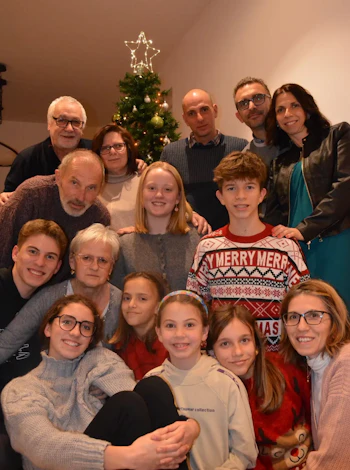High school exchange program
in Finland
Live the life of a Finnish student, staying with a host family and studying at a local high school on a semester or year exchange program.








Live like a local in the Land of Thousand Lakes
Student exchange program in Finland
Featuring amongst one of the world’s most liveable countries, Finland is an adventurous and safe Nordic country known for its stunning landscapes, happy people, progressive culture, Northern Lights phenomenon, and more. Finland is an ideal destination for sport lovers (think skiing, sailing, ice hockey), outdoor and nature enthusiasts, and students looking for a unique immersion in the Nordic lifestyle.
Although Finns may appear reserved and quiet when meeting new people, you will soon find out they are very hospitable and have a brilliant, witty sense of humour! Discover this enigmatic country from the inside, experience a world-class education and live like a Finn teenager for a semester or a year.

A country full of surprises
Nature
Finland is one of the woodiest countries in all of Europe; 70% of its territory is covered in forest, in addition to a legion of lakes, national parks and islets. A bounty of calm, unspoilt nature to connect and recharge.
What’s high school like in Finland?
Equality and freedom
The Finnish education system and society in general is based on two cornerstones: equality and freedom. In Finland, all students have equal opportunities to receive a high-quality education – in fact, education is totally free, including at university.
Leisure activities
Depending on the school, a wide range of options is on offer, including sports, arts and culture, crafts, science and nature. Activities are often carried out in collaboration with local clubs and associations.
Free school lunch
A free lunch is provided to all students in Finland, throughout their education journey - from early learning to the end of high school. Lunch is often served buffet-style and includes a warm main course, a side of vegetables, bread and spread, and a milk-based drink.
Three languages
Like in other northern European countries, most of the Finnish population is fluent in English. Both English and Swedish are commonly taught in school - ready to learn a new language (or two) and teach your classmates a few typical Australian English expressions?
A place full of magic. Let it amaze you with an exchange experience!
Choose authenticity – trust WEP and prepare to be amazed.
On a WEP Classic program, you will experience the true Finland. You may be placed anywhere in the country, depending on the location of the host family who has chosen you to share this incredible adventure with.
Volunteer host family
Public school
Placement anywhere in Finland
Semester or year programs available
Your host family during your exchange year
Gain a second family – they can’t wait to welcome you into their lives!
Here is why:
While Finland as a country is incredibly enigmatic to most foreigners, Finns pride themselves in being simple, modest and straightforward folks. Don’t mistake their apparent reservedness for disinterest – give them time and you’ll discover warm and friendly people.
The Finnish society places value on family time and inclusivity. In fact, work-life balance is highly emphasised and opportunities for family leave are generous, allowing working parents to spend time with their children... including you!
Personal wellbeing, including a healthy diet and balanced lifestyle, are important to Finns. Whether you have a competitive spirit or just want to have some fun, there will be plenty of opportunities to stay active: soccer, ice hockey, gymnastics, Nordic walking, fishing, skiing...


Your school in Finland
Find out more about your school experience in Finland
In Finland, compulsory education starts at the age of 6, with one year of pre-primary education before the beginning the basic education cycle. Basic or Comprehensive education starts at the age of 7 and lasts for 9 years, thus including grades 1-9 and including primary school and lower secondary school in a single structure system.
After completing basic education (usually at the age of 16), students choose if they wish to progress with upper secondary education or vocational training for a further three years.
Education from pre-primary all the way to higher education is free, ensuring equal opportunities for all. As such, education is compulsory until 18 years of age.
The Finnish education system
The national curriculum for basic education sees students learning a range of subjects that reflect today's society as well as the knowledge and skills needed in their future. Humanities, sciences, artistic/creative subjects are included.
Subjects taught at general upper secondary school include:
- mother tongue and literature
- second national language
- foreign languages
- maths and natural sciences
- biology and geography
- physics and chemistry
- humanities and social studies
- religion, culture, worldviews and ethics
- physical education
- arts and skills
- health education
- study and careers education
A strong focus is placed on developing transversal competences and subjects can have compulsory and elective modules.
Subjects in Finland
Unless students choose to enrol in vocational training, leading to a vocational qualification, secondary education in Finland consist of a three-year general upper secondary education program. On completion of this, students take the Finnish national matriculation examination and can then continue with tertiary studies.
Finnish secondary school
The Finnish Model for Leisure Activities was introduced in 2019 to ensure that every student has access to an enjoyable and free leisure activity as part of their school day.
The activities offered by a school are generally selected based on the wishes of the pupils. Many local students play a sport (floorball, soccer, ice hockey, athletics...), take part in artistic pursuits (drama, music, painting, sculpting...) or in activities related to science, nature and the environment. Follow their example to explore new interests and build friendships locally!
Extra-curricular activities
In Finland, the school year runs from mid-August until late May or early June and is divided into two periods: a Spring term and an Autumn term.
Holiday breaks include an autumn break in October, a Christmas break in December and a winter holiday in February. In addition, schools are closed during national public holidays, which include a few peculiar ones such as:
- 6th January: Epiphany, commemorating the visit of the Magi
- 1st May: May Day, also known as Walpurgis, commemorating the canonisation of Saint Walpurga and celebrated with carnival-style festivals in Finnish cities and towns
- June: Midsummer (the first Saturday after 19 June, as closely as possible to the summer solstice), celebrating the summer season with outdoor gatherings, bonfires and feasting
- 6th December: Independence Day, to celebrate Finland's declaration of independence from Russia in 1917
The school calendar
Grading systems are different in basic education, general upper secondary or vocational schools. For example, the first two use a 4-10 numerical grading scale, where 4 is the lowest (failing) grade), 5 is a pass, and 10 is the best mark.
The assessment, rather than on tests, is based on different demonstrations of learning, competence and skills related to the student achieving the objectives for a particular study unit.
Vocational schools use a 1-5 scale, where 1 is the lowest and 5 the highest score.
Grading system in Finland
Stories from students and parents who have been there
Here are the testimonials of families who have chosen WEP for their exchange experience.
Join one of our upcoming events
to learn everything there is to know
about our high school exchange programs!
Going with WEP is best
Since 1988, a wide choice of destinations and comprehensive assistance before, during and after your overseas program. WEP is the ideal partner for your big overseas adventure.
Like you, we also get to choose who we travel with: our schools, host families and overseas partner organisations are carefully selected.
We offer a custom-made insurance policy, specifically designed for our participants, and we have a solid network behind us.
Emergency assistance, overseas and from Australia, is available 7 days out of 7, 24 hours a day, 365 days a year.
Allowing all our participants to live their desired overseas experience is a mission, a challenge we're thrilled to accept.
FAQ
Your host family, local coordinator and your host organisation will provide you with support while you are overseas. WEP Australia will remain in contact with the host organisation and your parents to coordinate and support your experience. In case of an emergency, both you and your family will be able to call an emergency phone number that is answered 24/7.
You will be advised of your placement location, host family and host school as soon as feasible. This can range from a few months prior to departure, right up until departure, as a lot needs to happen behind the scenes before each student's placement process is complete and can be communicated to you with certainty. The placement process doesn't only include sourcing a suitable host family, but also finding availability at a local school, and completing all red tape (including, for example, lenghty criminal history checks in some countries). Prior to departure from Australia, all students will receive host family, host school and local coordinator details.
Independent travel is not permissible while on exchange. However, you will be able to travel with your host family, school, host organisation and other community groups such as sporting teams or scouts. Again, the foremost aim of the program is educational, and your priority for any holiday periods must be your host family, who will be investing a lot of time, energy and money into this experience - simply in return for your frienship and positive contribution to their household.
Generally speaking, overseas schools won't issue a diploma to exchange students who are only there for a short time and don't graduate at that school. You may however be provided with a honorary certificate, as well as a WEP certificate of completion, which however don't count towards credit or graduation in Australia.
Language experience is desirable, but not necessary, for most countries. However, some countries have mandatory language requirements. You'll find the specific requirements for each country listed on its page. Intensive language courses may, in some circumstances, meet language pre-requisites. WEP strongly recommends language preparation prior to departure as language knowledge is of enormous benefit in assisting you to quickly adapt to your new family, school and life.
Of course, there are English-speaking destinations available if you are not interested in learning another language.
No, it's the host families who choose the student they wish to invite into their home. Based on the documents you will submit as part of your WEP application, one lucky family will choose to open their home and hearts to you, which is why for all Exchange Classic programs, and many Flex programs as well, there is no avenue for students to choose a specific location.
It may be possible to live with an overseas family that you already know (excluding relatives of the student). However, the family will have to be screened and approved, prepared and supported by our partner organisation in the same manner as any other host family. School enrolment must also be available.
More questions?


